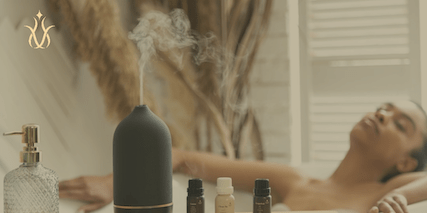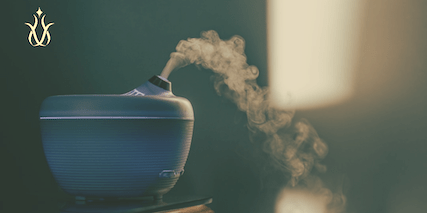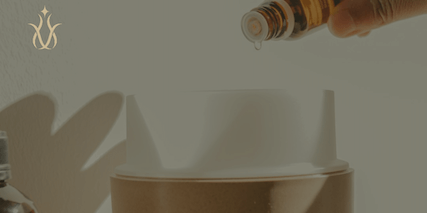Discover the power of essential oils to boost your mood. Explore the top uplifting oils and learn how their aromas can enhance your emotional well-being. Transform your mood naturally.
Introduction
For centuries, aromatic extracts have been used to promote well-being, and today, we’ll dive into how they can specifically help boost your mood.
Aromatherapy, the therapeutic use of essential oils, has historical roots reaching back to ancient civilisations. The Egyptians, Greeks, and Romans all recognised the potent benefits of these oils. Fast forward to the modern era, and science has started to unveil the mechanisms behind their impact on our mood.
The magic begins when you inhale these captivating scents. As the aroma fills your nostrils, it stimulates the olfactory system, our body’s ‘smell centre’. This sends signals directly to the brain’s limbic system, often referred to as the ’emotional brain’. The limbic system regulates emotions, memories, and arousal, explaining why particular scents can trigger powerful feelings and memories.
Certain essential oils have the potential to stimulate the production of mood-boosting neurotransmitters like serotonin and dopamine, leading to feelings of happiness, relaxation, and calm. Whether you’re feeling stressed, anxious, or simply in need of a pick-me-up, these natural extracts can offer a quick and effective way to boost your mood.

Understanding Aromatherapy and Mood Regulation
Unlocking the door to a better mood might be as simple as uncapping a bottle of essential oil. But how does this work? The answer lies in the science of aromatherapy and the complex system of the human brain. Aromatherapy is a natural approach that uses aromatic plant extracts and essential oils to enhance psychological and physical well-being.
The process begins when you inhale the aroma of an essential oil. The scent molecules travel up your nose where olfactory receptors recognise them. Upon this detection, a message is sent to the olfactory bulb, part of the brain’s limbic system, also known as the “emotional brain”.
The limbic system plays a crucial role in controlling mood, memory, behaviour and emotions. Hence, this olfactory stimulation influences the brain’s chemical balance, affecting neurotransmitters like serotonin and dopamine. These neurotransmitters are well-known for their mood-regulating functions. Simply put, certain scents can induce the release of these ‘feel good’ chemicals, thereby elevating mood and promoting a sense of well-being.
The Role of Essential Oils in Mood Enhancement
Essential oils, the core of aromatherapy, are much more than pleasing fragrances. These potent plant extracts can have profound effects on our emotions and moods. And this isn’t just a placebo effect or folklore; it’s grounded in the way our brains process these aromas.
When essential oils are diffused in the air, their aromatic molecules interact with the olfactory system and affect the limbic system, the part of the brain responsible for emotions, behaviours, and long-term memory. This brain-heart-nose connection explains why a simple whiff of a familiar scent can trigger powerful emotional responses or vivid memories.
Each oil has a unique chemical composition that can have various physiological and psychological effects. For instance, some oils might promote relaxation, while others could boost energy. By selectively using these oils, we can create an environment that encourages positive mood shifts and enhances overall emotional health.
Top Essential Oils for Boosting Mood
Embarking on the journey of mood enhancement through aromatherapy, let’s delve into the world of five select essential oils for uplifting, mood-boosting properties.
Lavender Essential Oil
Lavender is arguably the most revered essential oil for its versatile properties. Most noteworthy is its distinct ability to alleviate anxiety and promote a sense of calm. A study in the Journal of the Medical Association of Thailand found lavender essential oil to bring about a reduction in blood pressure, heart rate, and skin temperature, all physiological responses to stress. Used in diffusers or added to a relaxing bath, the aromatic lavender oil can indeed boost your mood on a gloomy day.
Ylang Ylang Essential Oil
This exotic, sweet-smelling oil has been revered for its mood-lifting and antidepressant properties. A 2015 study published in Phytotherapy Research demonstrated that inhalation of Ylang Ylang essential oil could significantly decrease cortisol levels and enhance psychological well-being. Adding a few drops to your diffuser or a lotion can give you a delightful, natural mood boost.
Peppermint Essential Oil
Peppermint essential oil, distilled from the leaves of the Mentha piperita plant, is imbued with a cool, crisp aroma, intertwining both freshness and a hint of sweetness. The invigorating scent of peppermint essential oil is more than just refreshing. Research indicates that it enhances memory and increases alertness. A study in the International Journal of Neuroscience showed that peppermint essential oil can significantly improve cognitive performance.
Peppermint essential oil is a preferred pick-me-up in aromatherapy, especially for combating fatigue or mental fog. The refreshing scent can help dispel feelings of nervous tension or anxiety, providing a natural way to boost your mood.
Lemon Essential Oil
Lemon essential oil is another excellent mood enhancer with its clean and refreshing scent. A 2016 study in the Journal of Clinical Psychopharmacology found that lemon essential oil could indeed reduce stress and elevate mood. Using it in a diffuser or applying it topically (diluted in a carrier oil) can help instil a sense of positivity.
Jasmine Essential Oil
Jasmine essential oil is a valuable addition to our list. Known for its sweet, pleasing fragrance, jasmine essential oil has been found to have a stimulating effect on the brain. A 2010 study published in Natural Product Communications showed that jasmine oil can uplift mood, produce a feeling of optimism and boost energy levels. A dab on the wrists or a few drops in the diffuser, jasmine oil is sure to bring about a sunny disposition.
Clary Sage Essential Oil
Clary sage essential oil, derived from the flowers and leaves of the Salvia sclarea plant, weaves an aromatic tapestry redolent of earthy and subtly floral notes.
Popular oil in aromatherapy, clary sage essential oil is believed to alleviate feelings of anxiety, depression, and stress. The comforting aroma of Clary sage essential oil can promote a sense of well-being and tranquillity.
Sweet Orange Essential Oil
Sweet orange essential oil, extracted from the peel of the Citrus sinensis fruit, radiates a bright, zesty aroma that captures the essence of sun-kissed orchards. The invigorating scent of sweet orange is heralded for dispelling feelings of gloom and tension. When diffused, it can promote a sense of joy, uplift moods, and help alleviate stress.
- Citrus oils, including sweet orange, can make skin more sensitive to sunlight. Avoid direct sunlight or UV rays for up to 12 hours after applying products containing it.
- Always dilute citrus oils with a carrier oil before topical application to minimize the risk of skin irritation.
Bergamot Essential Oil
Bergamot essential oil, a fragrant gem hailing from the cold-pressed peel of the Citrus bergamia fruit, boasts an elegantly citrusy aroma tinted with floral undertones. The ethereal scent of Bergamot essential oil can act as an emotional balancer. In aromatherapy, its fragrance is believed to dissipate feelings of melancholy and tension, paving the way for uplifted spirits and renewed optimism.
Bergamot essential oil can heighten skin’s sensitivity to sunlight, leading to quicker sunburns or discolouration. It’s advisable to avoid sun exposure after applying products containing bergamot, especially if they are not bergapten-free.
Rosemary Essential Oil
Rosemary essential oil, a fragrant distillation from the needle-like leaves of the Rosmarinus officinalis plant, carries the spirit of the Mediterranean within its aromatic molecules.
Fabled as a symbol of remembrance, rosemary essential oil is believed to sharpen memory and concentration. In the realm of aromatherapy, its invigorating scent is thought to foster clarity and attentiveness.
- It’s advised for individuals with epilepsy or high blood pressure to exercise caution when using rosemary oil.
- Pregnant women might opt to avoid or limit the use of rosemary essential oil.
Using Essential Oils Safely for Mood Enhancement
While essential oils provide an effective natural solution for mood enhancement, it’s crucial to remember that they should be used responsibly. Despite their numerous health benefits, these potent botanical extracts can cause skin irritation if applied undiluted. Essential oils, when ingested, may cause toxicity or interact adversely with certain medications.
Pregnant and breastfeeding women and individuals with chronic health conditions should seek advice from healthcare professionals before incorporating essential oils into their routines. Furthermore, avoid contact with the eyes, inner ears, or any sensitive areas. Conducting a patch test before using a new essential oil to rule out allergic reactions is always a good practice.

How to Use Essential Oils for Mood Enhancement
Incorporating essential oils for uplifting mood enhancement can be achieved through various methods.
Diffusion: A diffuser disperses the oil into the air, filling the room with a pleasant scent. This method allows for continuous inhalation of the oil, thus maximizing its mood-boosting effects.
Inhalation: Simply inhaling the oil directly from the bottle or applying a few drops onto a handkerchief or cotton ball can offer immediate benefits.
Topical Application: Diluted in a carrier oil like coconut or almond oil, essential oils can be applied to the skin. Areas like the wrists, behind the ears, or the soles of the feet are ideal as they allow for quick absorption.
Aromatic Baths: Adding a few drops of essential oil to your bath can create a calming and rejuvenating experience.
Choosing High-Quality Essential Oils
To ensure maximum therapeutic benefits, choosing high-quality essential oils is paramount. Be wary of synthetic fragrances masquerading as essential oils. A genuine essential oil is purely plant-derived, without any additives or artificial substances.
When choosing, consider the following:
Purity: The oil should contain only aromatic plant compounds, without any additives or synthetic oils. Check the label for words like ‘pure’, ‘natural’, and ‘organic’.
Reputation: Purchase from a reputable brand known for its commitment to quality and purity.
Price: High-quality oils are often more expensive due to the extensive process involved in extracting the oils.
Packaging: Essential oils should be sold in dark glass bottles to protect the oil from sunlight, which can deteriorate the oil over time.
Conclusion
As we reach the end of our aromatic journey, let’s take a moment to recall the incredible power of essential oils in boosting your moods. We’ve explored the fantastic benefits of lavender, ylang-ylang, peppermint, lemon, and jasmine oils, each offering unique attributes to uplift, soothe, and energise our mind and body. From the potent, tranquil serenity of lavender to the invigorating zest of lemon, these oils truly prove the essence of nature’s therapy.
Remember, however, that aromatherapy isn’t a one-size-fits-all solution. What works for one may not work for another. It’s all about personalisation and finding the unique blend that resonates with your individual needs. Use them wisely, pay close attention to the safety measures, and always opt for high-quality, pure, organic essential oils for the best results. And finally, as with any wellness practice, patience and consistency will yield the most beneficial outcomes.
Frequently Asked Questions
Are there any scientific studies supporting the use of these oils for mood enhancement?
The medical literature indicates that certain essential oils may have mood-enhancing effects. Lemon oil, for instance, has been shown to enhance positive mood compared to water and lavender, with self-report and unobtrusive mood measures providing robust evidence of its efficacy.
Additionally, the diffusion of Citrus Bliss, Grapefruit, and Wild Orange in a clinical setting has been associated with significant improvements in nurses’ mood, stress, depression, and distress.
Peppermint oil has been found to increase alertness and enhance memory, which could contribute to mood enhancement.
These findings suggest that the inhalation of certain essential oils can have a positive impact on mood, although the specific mechanisms by which they exert these effects are not fully understood, and further research is needed to establish guidelines for their use in mood enhancement.
It is important to note that while these studies provide evidence of mood enhancement, the dosages and methods of application vary, and there is no standardized approach for using essential oils for this purpose.
Can Essential Oils be Directly Applied to the Skin?
Essential oils are potent and can cause irritation or allergic reactions if applied directly to the skin. Always dilute them with a carrier oil, like jojoba or almond oil, before applying topically.
How Can I Use Essential Oils for Mood Enhancement?
Essential oils can be used in several ways for mood-boosting, including diffusing, inhaling directly, applying topically (when properly diluted), or adding a few drops to your bath.
What are the Best Essential Oils for Anxiety?
A: The best essential oils for anxiety include lavender, chamomile, bergamot, rose, and frankincense. These oils can help promote relaxation and reduce stress.
What are the Best Essential Oils for Headaches?
The best essential oils for headaches include peppermint, lavender, eucalyptus, rosemary, and chamomile. These oils have soothing and analgesic properties that can help alleviate headache symptoms.
Can I Ingest Essential Oils?
Essential oils should not be ingested unless under the guidance of a trained and qualified health professional. Some oils can be toxic if ingested.
Are There Any Side Effects to Using Essential Oils?
A: While essential oils are generally safe when used properly, they can cause reactions in some people, particularly if used undiluted. Always do a patch test to check for any allergic reaction.
What Should I Look for When Purchasing Essential Oils?
Always choose high-quality, pure, organic essential oils from reputable brands. Check for labels that specify the botanical name of the plant, country of origin, and whether the oil is pure, organic, or undiluted.
What are the Best Essential Oil Brands?
The following are considered some of the top essential oil brands:
doTERRA: Recognised worldwide for their high-quality, pure essential oils. They source their oils from all over the world.
Young Living: This company has a ‘Seed to Seal’ promise, emphasising their commitment to quality, from the growth of the plant to the bottling of the oil.
Neal’s Yard Remedies: This UK-based company is well-known for its organic, ethically sourced products, including a wide range of essential oils.
Tisserand Aromatherapy: This brand offers a vast array of essential oils and has been a trusted name in aromatherapy for over 40 years.
Plant Therapy: They offer a large selection of oils and are recognised for their quality, transparency, and education around essential oils.
Aromatherapy Associates: Known for their blends, this brand has high-quality products often used in spas.
Base Formula: This company is well-regarded in the UK for their high-quality, therapeutic-grade essential oils.
It’s important to note that the “best” brand often depends on personal preference, specific needs, and budget. Always ensure that you’re purchasing 100% pure essential oils, and be wary of anything significantly cheaper than other brands, as it may be a sign of lesser quality or purity.
What are the Best makes of Essential Oil Diffuser?
The following are considered some of the best essential oil diffusers:
VicTsing 150ml Essential Oil Diffuser: This diffuser is known for its stylish design and capacity to run up to 9 hours. It also has a quiet operation and an auto-off feature, making it safer.
ASAKUKI 500ml Premium Essential Oil Diffuser: A larger model, this diffuser doubles as an air humidifier and boasts a large water tank for extended running time. It has multiple mist nebulizer modes and an auto safety switch that prevents it from overheating when it runs out of water.
InnoGear 200ml Aromatherapy Essential Oil Diffuser: This diffuser by InnoGear is compact but powerful, and it includes seven colour mood lighting to fit various environments.
Tisserand Aroma Spa Diffuser: From a well-known brand, this diffuser changes colours and can run constantly for up to four hours.
The White Company Electronic Diffuser: This luxury diffuser offers up to 5 hours of continuous diffusion and has a timer with settings for 2, 4, and 6 hours.
URPOWER 2nd Version Essential Oil Diffuser: A favourite due to its compact design and budget-friendly price, the URPOWER diffuser also features seven colours of LED lights and can run for 6 hours at a stretch.
It’s important to remember that the “best” diffuser can depend on personal preference, room size, and other factors, so consider these when making your selection. Please check online resources or directly with retailers for the most accurate and updated information.
References:
Fung TKH et al (2021). Therapeutic Effect and Mechanisms of Essential Oils in Mood Disorders: Interaction between the Nervous and Respiratory Systems. Available at: https://pubmed.ncbi.nlm.nih.gov/34063646/
Malcolm BJ et al (2018). Essential oil of lavender in anxiety disorders: Ready for prime time? Available at: https://pubmed.ncbi.nlm.nih.gov/29955514/
John Hopkins (2022): Do Essential Oils Really Work? Available at: https://www.hopkinsmedicine.org/health/wellness-and-prevention
J. K Kiecolt-Glaser et al. Psychoneuroendocrinology 2008 Apr;33(3):328-39. Available at: https://pubmed.ncbi.nlm.nih.gov/18178322/
National Association for Holistic Aromatherapy. (2023). Exploring Aromatherapy: Essential Oils and Mood. Available from: https://naha.org/explore-aromatherapy/about-aromatherapy
Mayo Clinic. (2023). Home Remedies: What are the benefits of aromatherapy? Available from: https://newsnetwork.mayoclinic.org/discussion/home-remedies-what-are-the-benefits-of-aromatherapy/
Disclaimer: This article is for informational purposes only and should not replace professional medical advice. If you have specific concerns or medical conditions, it is recommended to consult with a healthcare professional for personalised guidance and support.
Related Topics:
Meditation: Your questions answered
Mindfulness: Your Questions Answered
Wellness Escapes: The Best Luxury Wellness Retreats in the World






